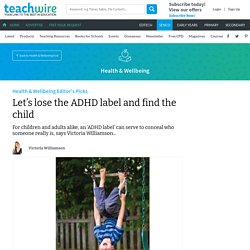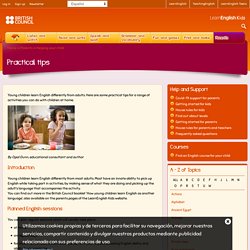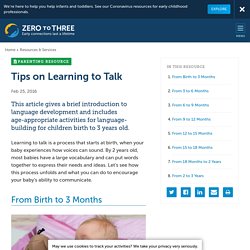

Phonics Vocabulary. Pre-birth to Three: Observation, Assessment and Planning. Let’s lose the ADHD label and find the child. When I trained as a primary school teacher 15 years ago, these were some of the words used to describe children with ADHD: ‘Difficult.’

‘Challenging.’ ‘Disruptive.’ There were others, whispered by harassed-looking teachers in the staffroom or concerned parents at the school gates, but none seemed to be positive. When I got my first ‘real’ class to teach, and saw that some of the children came with the dreaded ‘ADHD’ label attached, I approached the new term with butterflies the size of dragons in my stomach. But here’s what it took me a few more years to learn… Development Matters FINAL PRINT AMENDED. Observation, assessment and planning. Providing resources and opportunities. Practical tips. By Opal Dunn, educational consultant and author Introduction Young children learn English differently from most adults.

Most have an innate ability to pick up English while taking part in activities, by making sense of what they are doing and picking up the adult’s language that accompanies the activity. Nursery Rhymes and Songs - BBC Teach. Music and Movement Activities for Toddlers and Preschoolers.
50+ Quick & Easy Kids Crafts that ANYONE Can Make! Short stories for kids. How to teach children English using illustrated storybooks. What makes illustrated storybooks such a good resource for teaching young learners of English?
The British Council’s Gail Ellis, co-author of a storytelling handbook for primary English language teachers, explains. Listen to an interview with Gail in our podcast and register for her webinar taking place on Thursday, 2 October. Illustrated storybooks provide an ideal resource for helping children learn English. This is because children love listening to stories.
Moodle. Ten ways to support your child’s English-learning at home. As the British Council opens a new Learning Time with Shaun & Timmy centre in Mexico for two- to six-year-olds, senior teacher Sarah Reid offers some useful tips for supporting your child’s learning at home. More and more parents want their children to learn English from a young age. I often meet parents of children as young as two or three who say that proficiency in speaking English will help their child 'get ahead in a globalised world'. In other words, the sooner their children get started, the better. The single most important factor in a child’s success with English is their parents' interest and encouragement, no matter what their child’s age. So what can parents do at home to support their learning? 1. To build a positive attitude towards learning, and towards English as a language, the best place to start is with yourself. 2.
Children will naturally learn everything around them without any adult intervention. 3. 4. 5. Learning_through_play_ey. Language development opportunities. Moodle. PowerfulInteractions.pdf. Moodle. The Brain-Changing Power of Conversation. The Science Researchers used highly faithful audio recorders — a system called Language Environment Analysis (known as LENA) — to capture every word spoken or heard by 36 4–6 year olds from various socioeconomic backgrounds over two full days. The recordings were analyzed to measure the number of words spoken by each child, the number of words spoken to each child, and the number of conversational turns — back-and-forth exchanges initiated by either adult or child. Comparing those measurements with brain scans of the individual children, the analysis found that differences in the number of conversational turns accounted for differences in brain physiology, as well as for differences in language skills including vocabulary, grammar, and verbal reasoning.
Read the MIT News story for a fuller summary of the research. The Takeaways The “conversational turns” are key here, the researchers say. How can parents and teachers best educate young children? What principles can both teachers and parents bring to the education of very young children? Gillian Craig, who was part of the Learning Time with Shaun and Timmy writing team, explains. As teachers and parents, we follow certain principles in our roles. Moodle. ThePowerofPlay. Pts why play is important. Importance of play for babies & children. Australian Government Department of Education and Training (2009).
Belonging, being and becoming: The early years learning framework for Australia. Canberra: Commonwealth of Australia. Retrieved 19 June 2019 from Cole-Hamilton, I. (2011). Getting it right for play: The power of play: An evidence base. Fleer, M. (2013). Ginsburg, K.A. (2007). Taking Playtime Seriously. So part of encouraging play is pulling back on how much programmed goal-directed learning we expect from very young children, to leave them time for the fun of exploration, curiosity and, well, fun. But another important part may be creating environments that foster children’s play and parents’ participation and attention. Dr. Hirsh-Pasek, who is a senior fellow at the Brookings Institution, cited its Learning Landscapes Initiative, which aims to set up learning opportunities in public places where people will encounter them. One of these, the Urban Thinkscape project in Philadelphia, involves puzzle benches at bus stops, with puzzles designed to build STEM skills.
Before the benches were installed, she said, parents waiting for buses were almost uniformly looking at their cellphones. “We put one up in a park,” she said. Free play, she said, reduces stress and also “allows our kids to flex their entrepreneurial muscle.” ZERO TO THREE. Safety considerations. Password protected padlet. Children need time to play. Play and learning. Getting the right balance between adult-led and child-initiated learning.
Tips on Learning to Talk. Learning to talk is a process that starts at birth, when your baby experiences how voices can sound.

A few more myths about speakers of multiple languages. Does multilingualism cause language delays and identity problems? The British Council's Nayr Ibrahim busts a few more myths about speakers of multiple languages. Myth: Multilingualism causes language delay Raising children bilingually is sometimes believed to cause language delay. This misconception is based on a separate underlying proficiency (SUP) hypothesis. This theory, now discredited, suggests that languages are stored in separate compartments or containers, which represent half the capacity of the monolingual brain.
Alison Gopnik: What do babies think? Parents articles how young children learn english as another language english. Early Years.